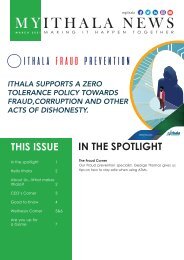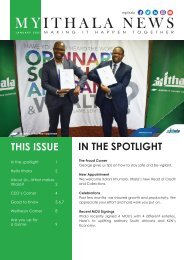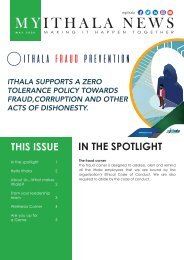Record of Advice
You also want an ePaper? Increase the reach of your titles
YUMPU automatically turns print PDFs into web optimized ePapers that Google loves.
WWW.MYITHALA.CO.ZA
1. WHAT SHOULD ADVISORS INCLUDE<br />
IN A RECORD OF ADVICE?<br />
The General Code <strong>of</strong> Conduct (GCOC) prescribes that the record <strong>of</strong> advice “must<br />
reflect the basis on which the advice was given,” so it has to include specific<br />
components.<br />
These are<br />
1.1. A brief summary <strong>of</strong> the information and material on which the advice was based.<br />
A key factor leading up to the point <strong>of</strong> advice is understanding a client’s circumstances,<br />
financial situation, financial product experience, goals, and objectives as they relate to the<br />
need or needs being addressed. Having done this, you can then apply your pr<strong>of</strong>essional skill,<br />
knowledge, and experience to identify a suitable solution for the client. The record <strong>of</strong> advice<br />
must include a summary <strong>of</strong> this information, as it provides the context for the advice given. It<br />
should be detailed enough so that a third party, including the FAIS Ombud, can easily make<br />
the connection with your recommendation. While the questions and information asked will<br />
differ depending on the need being addressed, the requirement to document remains the<br />
same.
1.2. The financial products which were considered and why these were considered.<br />
It is important to document the different financial products that you considered before<br />
making a final recommendation to your client.<br />
This section <strong>of</strong> the record <strong>of</strong> advice should therefore reflect all the financial products you<br />
considered before arriving at the most suitable solution for the client.<br />
1.3. The financial products recommended with an explanation <strong>of</strong> why.<br />
After assessing a client’s information and evaluating possible options, you are expected to<br />
recommend or select the product you believe best suits the client’s needs and objectives.<br />
This should be accompanied by an explanation to substantiate and give reasons for this<br />
advice. In other words, this very important part <strong>of</strong> the record <strong>of</strong> advice sets out your rationale.<br />
The financial product may not meet the client’s every criteria or need but, on balance, should<br />
be the most appropriate <strong>of</strong> the different options. The record <strong>of</strong> advice should provide enough<br />
detail to support your recommendation.
If the summary <strong>of</strong> information on which the advice was based and the reason why a<br />
recommendation was made is limited, you will find it difficult to prove you have been fair to<br />
your client and provided appropriate and suitable advice.<br />
The GCOC also describes the type <strong>of</strong> information that must be included when replacing one<br />
financial product with another, please refer to the GCOC for the specific requirements in<br />
relation to product replacement.<br />
1.4. Important information<br />
A record <strong>of</strong> advice should also include those important and material aspects <strong>of</strong> the financial<br />
product that the client must be aware <strong>of</strong> so that their expectations are in line with how the<br />
product will perform and they clearly understand how to meet their obligations.<br />
The ROA must be retained for future reference and a copy <strong>of</strong> the ROA must be given to the<br />
client<br />
2. LEGISLATIVE REQUIREMENTS<br />
Financial advisors are compelled to comply with the FAIS Act and the General Code <strong>of</strong><br />
Conduct for Authorised Financial Services Providers and Representatives (the Code <strong>of</strong><br />
Conduct). Below are the specific sections <strong>of</strong> the Code <strong>of</strong> Conduct that are particularly relevant<br />
to client advice records and financial needs analysis:
Sections 8(1) (a) – (c) require a financial advisor to obtain appropriate information from the<br />
client regarding his/her financial position. The financial advisor is required to conduct an<br />
analysis based on the information provided, provide the client with adequate advice and<br />
identify financial products that are appropriate for the client’s risk pr<strong>of</strong>ile and financial needs.<br />
Section 8(2) requires a financial advisor to ensure that the client understands the advice<br />
given and that the client is placed in a position that enables him/her to make an informed<br />
decision regarding the product selection.<br />
Section 9(1) requires a financial advisor to provide the client with a record <strong>of</strong> advice which<br />
contains a summary <strong>of</strong> the information and material on which the advice was based, the<br />
financial products which were considered, and the financial product or products recommended<br />
with an explanation <strong>of</strong> why the product or products selected is or are likely to satisfy the<br />
client’s identified needs and objectives
WW W.MYITHALA.CO.ZA

















